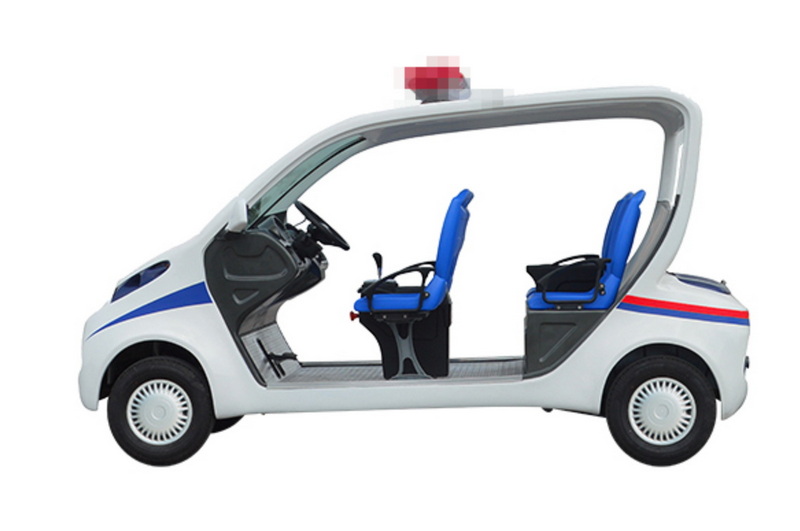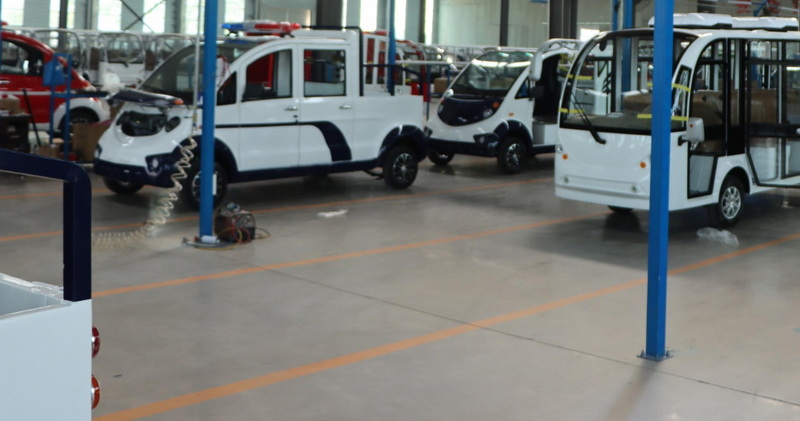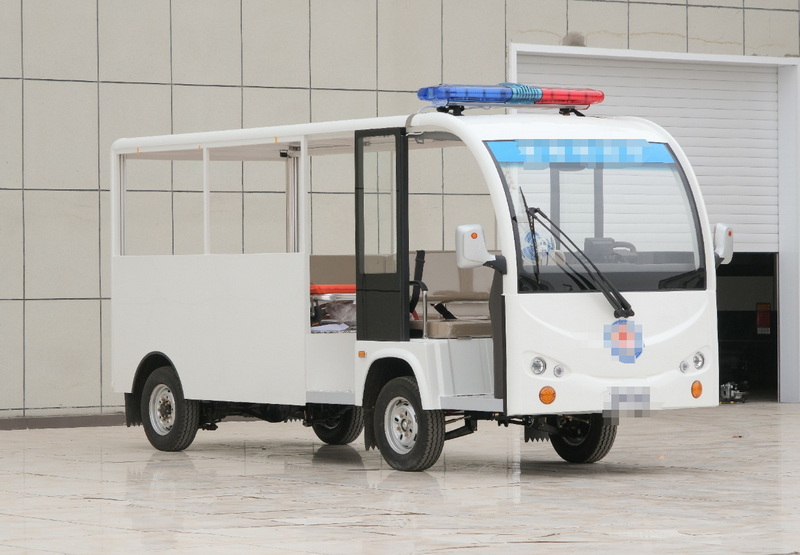Content Menu
● Introduction to Electric Patrol Cart Factories
● Key Quality Verification Criteria
● Quality Control Processes in Electric Patrol Cart Factories
● Inspection and Testing Methods
● Certifications and Compliance
● Factory Visit: What to Look For
● Technology and Innovation in Quality Assurance
● Additional Factors to Consider
● Conclusion
● FAQ
>> 1. How can I verify the certifications of an Electric Patrol Cart Factory?
>> 2. What are the most important quality tests for electric patrol carts?
>> 3. How often should quality inspections be done during production?
>> 4. Can I request customization from an Electric Patrol Cart Factory?
>> 5. What role does technology play in quality control?
Electric patrol carts are essential vehicles widely used in security, campus management, industrial parks, and large facilities for efficient patrolling and transportation. Ensuring the quality of these carts is crucial for safety, durability, and operational efficiency. This comprehensive guide will help you understand how to verify the quality of an Electric Patrol Cart Factory before making a purchase or establishing a partnership.

Introduction to Electric Patrol Cart Factories
An Electric Patrol Cart Factory specializes in designing, manufacturing, and assembling electric patrol vehicles. These factories integrate various components such as electric motors, batteries, chassis, and control systems to produce reliable carts that meet specific security and transportation needs. The quality of the factory directly influences the final product's performance, safety, and longevity.
Electric patrol carts are designed to be lightweight, energy-efficient, and easy to maneuver in various environments. They often serve critical roles in patrolling large areas, transporting personnel or equipment, and providing a mobile platform for surveillance. Given their crucial role, the manufacturing process must prioritize quality at every step.
Key Quality Verification Criteria
When verifying the quality of an Electric Patrol Cart Factory, consider the following critical factors:
- Experience and Reputation: Established factories with years of experience tend to have refined production processes and better product reliability. Research the factory's history, client testimonials, and case studies to gauge their market standing.
- Production Capacity and Equipment: Modern factories equipped with advanced machinery and automated quality control systems ensure consistent product quality. High production capacity often correlates with better supply chain management and timely deliveries.
- Quality Control Systems: Factories should have strict inspection protocols at every stage of production, from raw materials to finished products. Look for documented quality assurance procedures and evidence of continuous improvement.
- Certifications: Look for certifications like CE, ISO, or other relevant safety and quality standards that prove compliance with international norms. These certifications indicate that the factory adheres to recognized manufacturing and safety standards.
- Customization and Innovation: Ability to customize carts according to client needs and use innovative technologies for enhanced performance. This flexibility shows the factory's technical competence and customer-oriented approach.
- After-Sales Service and Support: Quality factories provide robust after-sales support, including maintenance, spare parts availability, and technical assistance, which are essential for long-term satisfaction.
Quality Control Processes in Electric Patrol Cart Factories
A reputable Electric Patrol Cart Factory implements rigorous quality control processes throughout the manufacturing cycle:
- Incoming Material Inspection: All raw materials and spare parts undergo strict quality checks to ensure they meet specifications. This includes testing metals for strength, batteries for capacity, and electronic components for functionality.
- In-Process Inspection: During assembly, continuous inspections ensure components fit correctly and function as intended. Workers and quality inspectors verify alignment, wiring, and mechanical connections at various stages.
- Performance Testing: Finished carts are tested for climbing ability, battery endurance, braking efficiency, and overall operational performance. These tests simulate real-world conditions to ensure reliability.
- Final Quality Inspection: Before shipment, a comprehensive check verifies the product's conformity to design specifications and safety standards. This includes visual inspection, functional testing, and packaging integrity.
Factories with advanced quality control often use statistical quality control (SQC) methods to monitor production trends and detect anomalies early. This proactive approach minimizes defects and enhances product consistency.
Inspection and Testing Methods
To verify the quality of products from an Electric Patrol Cart Factory, the following inspections and tests are typically conducted:
- Initial Production Check (IPC): Ensures the factory understands product specifications and is prepared to produce accordingly. This step often involves producing a small batch or prototype for approval.
- During Production Check (DUPRO): Random inspections during production to identify and correct defects early. This helps maintain quality throughout the manufacturing process.
- Final Random Inspection (FRI): A detailed check of finished products before shipment, including packaging and labeling verification. This step confirms that the products meet all contractual and regulatory requirements.
- Functional Tests: Power-on tests, battery performance, braking, and safety feature checks. These tests verify that the cart operates safely and efficiently under expected conditions.
- Durability Tests: Drop tests, vibration tests, and environmental exposure tests to simulate real-world conditions. These tests ensure the cart can withstand daily wear and harsh environments.
- Electrical Safety Tests: Verification of insulation resistance, leakage current, and protection against electrical hazards to ensure user safety.
- Noise and Emission Tests: Especially important for electric vehicles to confirm they meet noise regulations and have minimal environmental impact.
Implementing these testing methods helps factories produce high-quality electric patrol carts that meet or exceed customer expectations.

Certifications and Compliance
Certifications are vital indicators of factory quality and product safety. Common certifications for electric patrol carts include:
- CE Certification: Ensures compliance with European safety and environmental standards, covering electrical safety, electromagnetic compatibility, and mechanical safety.
- ISO 9001: Reflects the factory's commitment to quality management systems, focusing on consistent production processes and customer satisfaction.
- RoHS Compliance: Confirms that materials used are free from hazardous substances like lead, mercury, and cadmium, ensuring environmental friendliness.
- UL Certification: Particularly important for electrical components, UL certification verifies compliance with North American safety standards.
- Other Regional Certifications: Depending on the market, additional certifications such as FCC (for electromagnetic interference), DOT (Department of Transportation), or local safety approvals may apply.
Verifying these certifications involves requesting official documentation and cross-checking with issuing agencies. Factories that maintain up-to-date certifications demonstrate a commitment to quality and regulatory compliance.
Factory Visit: What to Look For
When visiting an Electric Patrol Cart Factory, focus on these aspects:
- Clean and Organized Production Environment: A tidy factory floor indicates professionalism and attention to detail, which often correlates with higher product quality.
- Advanced Manufacturing Equipment: Presence of automated inspection tools like 3D scanners, CNC machines, and robotic assembly lines ensures precision and repeatability.
- Skilled Workforce: Trained technicians and engineers overseeing production and quality assurance are essential for maintaining high standards.
- Sample Testing Stations: Dedicated areas for testing finished products, including battery testing rooms, braking test tracks, and environmental chambers.
- Documentation and Traceability: Well-maintained records of quality checks, production batches, and material sourcing allow tracking and accountability.
- Safety Protocols: Observing safety measures for workers and equipment reflects a factory's overall management quality.
During the visit, engage with factory managers and quality control personnel to understand their processes and challenges. Request to see sample products and test results to verify claims.
Technology and Innovation in Quality Assurance
Leading Electric Patrol Cart Factories adopt cutting-edge technologies to enhance quality control, such as:
- Automated Quality Control Systems: Use of 3D scanning and digital measurement tools to speed up inspections without compromising accuracy. These systems detect dimensional deviations and assembly errors in real time.
- Data-Driven Quality Management: Real-time data collection and analysis help identify defects early and optimize production parameters for better outcomes.
- Advanced Battery Testing Equipment: Sophisticated testers evaluate battery capacity, charging cycles, thermal stability, and safety under various conditions.
- Simulation and Modeling Software: Engineers use computer simulations to predict product performance under different terrains and weather conditions, reducing the need for costly physical prototypes.
- Internet of Things (IoT) Integration: Some factories implement IoT devices to monitor machine health and production status, enabling predictive maintenance and minimizing downtime.
- Virtual Reality (VR) and Augmented Reality (AR): Used for training workers and visualizing assembly processes, improving accuracy and reducing errors.
These innovations not only improve product quality but also shorten production cycles and reduce costs, benefiting both manufacturers and customers.
Additional Factors to Consider
Beyond the technical and procedural aspects, several other factors can influence the quality and reliability of an Electric Patrol Cart Factory:
- Supply Chain Management: Reliable sourcing of high-quality components is critical. Factories with strong supplier relationships tend to produce better products.
- Environmental Responsibility: Factories adhering to green manufacturing practices reduce environmental impact and often produce safer products.
- Customer Feedback and After-Sales Service: Factories that actively collect and act on customer feedback demonstrate commitment to continuous improvement.
- Warranty and Maintenance Policies: Comprehensive warranties and accessible maintenance services indicate confidence in product quality.
- Pricing vs. Quality Balance: Extremely low prices may indicate compromised quality. Evaluate pricing in the context of materials, technology, and service offered.
Conclusion
Verifying the quality of an Electric Patrol Cart Factory involves a comprehensive evaluation of the factory's experience, production capabilities, quality control processes, certifications, technological adoption, and additional operational factors. By conducting thorough inspections, reviewing certifications, visiting the factory, and understanding their innovation capabilities, buyers can ensure they partner with a manufacturer that delivers safe, reliable, and high-performance electric patrol carts. This due diligence not only protects investment but also ensures operational safety and efficiency in the long term.

FAQ
1. How can I verify the certifications of an Electric Patrol Cart Factory?
Check for official documents like CE, ISO certificates, and request copies directly from the factory. Verify their authenticity through issuing bodies or online certification databases to ensure they are valid and up to date.
2. What are the most important quality tests for electric patrol carts?
Key tests include battery performance and endurance, braking efficiency, durability under environmental stress (such as vibration and temperature), electrical safety, and functional safety features like emergency stop systems.
3. How often should quality inspections be done during production?
Inspections should be conducted at multiple stages: initial production check (IPC) to confirm readiness, during production checks (DUPRO) at regular intervals (usually 20-50% completion), and final random inspection (FRI) before shipment to ensure compliance with specifications.
4. Can I request customization from an Electric Patrol Cart Factory?
Yes, many factories offer customization options to meet specific requirements such as size, speed, battery capacity, additional safety features, or specialized equipment mounts. Discuss your needs early to ensure feasibility and pricing.
5. What role does technology play in quality control?
Technology enhances accuracy, speed, and consistency in quality control. Automated inspection systems, data analytics, advanced testing equipment, and simulation software help detect defects early, optimize production, and ensure that every cart meets stringent quality standards.










































